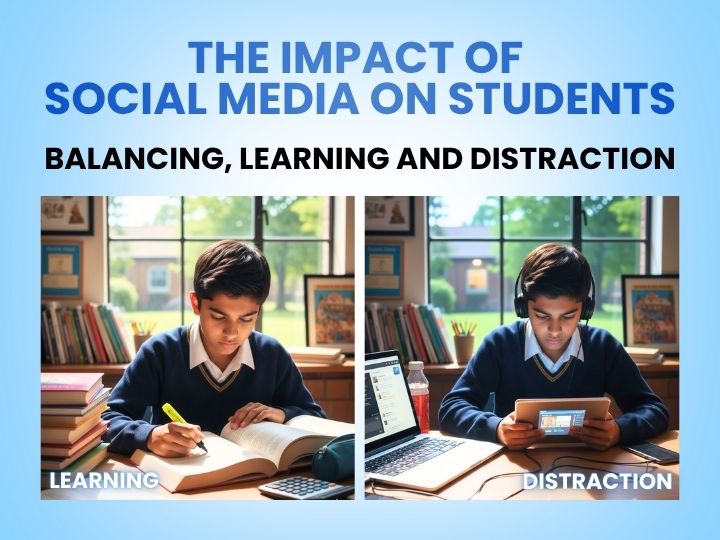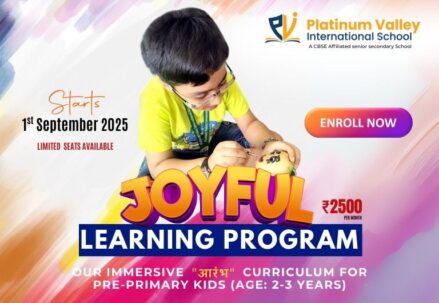In today’s digital age, the impact of social media on students is undeniable. Platforms like Instagram, Facebook, YouTube, and WhatsApp have become an integral part of how young learners connect, communicate, and consume information. Social media has a dual impact on students, offering significant benefits for learning, communication, and skill development, while also presenting challenges such as academic distraction, mental health issues, and sleep disruption. Balancing these requires awareness and mindful digital practices.
Parents often wonder how social media influences their child’s education and development. By understanding its impact, families and schools can work together to promote responsible and healthy online behavior. As a top school in Ghaziabad, Platinum Valley International School is committed to guiding students toward using technology as a tool for learning and personal growth, helping them achieve balance in both their online and offline lives.
The Positive Impact of Social Media on Student Growth and Learning
The impact of social media on students extends beyond entertainment. It has reshaped how children learn, interact, and perceive the world. While the benefits are significant, the drawbacks must be managed thoughtfully. Schools, teachers, and parents play a crucial role in ensuring students experience the positive side of technology while staying safe and focused.
The Positive Impact: Learning and Connection
Access to Educational Resources
One of the biggest benefits of social media in learning is easy access to educational content. Students can explore subjects through video tutorials, academic pages, online forums, and virtual classes. Platforms like YouTube, LinkedIn Learning, and Coursera provide knowledge beyond textbooks, making education interactive and flexible. The impact of social media on students is evident as it helps bridge the gap between classroom learning and real-world applications.
Enhanced Communication and Collaboration
Social media enables students to connect with teachers, peers, and experts worldwide. Platforms such as Google Classroom and Microsoft Teams support group projects, discussions, and online study sessions. These tools improve teamwork and foster a sense of community. Social media affects students positively by teaching collaboration, responsibility, and effective communication.
Skill Development and Creativity
Social media platforms encourage creativity through art, writing, design, and video production. Students use these tools to express themselves and discover new talents. Learning to create content enhances communication, marketing, and technical skills. This shows how the impact of social media on students extends far beyond academics—it prepares them for future careers in a digital world.
Read More: Good Habits in Students That Improve Focus, Values, and Performance
Networking and Support Systems
Students can join global learning communities, participate in online workshops, and connect with mentors. These student engagement online opportunities build confidence, cultural understanding, and professional awareness. Networking on platforms like LinkedIn also helps students explore academic and career possibilities, fostering a growth mindset.
Global Awareness
Social media exposes students to global issues such as sustainability, equality, and innovation. It helps develop empathy and awareness about different cultures. This global exposure strengthens values like tolerance and inclusivity—essential traits for students studying at an international school in Ghaziabad.
How Social Media Can Distract Students and Affect Their Well-Being
While social media enhances learning, overuse can negatively affect a student’s focus, health, and productivity. It’s important to recognize these challenges to guide students toward mindful social media use and responsible habits.
Academic Distraction
Constant notifications, scrolling, and online chats can easily divert students’ attention from studies. This social media effect on students reduces concentration and academic performance. Encouraging time management for students and using screen-time limits can help maintain balance and prevent procrastination.
Mental Health Concerns
The pressure to gain likes or compare lifestyles can lead to stress, anxiety, and low self-esteem. The impact of social media on students isn’t just academic — it also affects emotional well-being. A recent UNICEF discussion article noted that excessive social-media use among adolescents is linked to increased anxiety and feelings of loneliness, underlining the importance of promoting mindful social media use and regular offline interaction.
Promoting positive digital spaces and regular offline interactions helps reduce these effects and builds resilience.
Sleep Deprivation
Late-night browsing and gaming often cause student screen addiction, leading to irregular sleep cycles. Sleep deprivation impacts memory, focus, and mood. Students must learn to disconnect before bedtime and create screen-free routines to improve rest and performance.
Misinformation and Critical Thinking
Not everything online is true. Students often come across misleading posts and unverified information. Developing digital literacy and critical thinking skills helps them analyze sources carefully. Schools must teach students how to fact-check content and evaluate authenticity before believing or sharing it.
Reduced Real-World Interaction
Excessive screen time can limit face-to-face communication and physical activities. Students who spend too much time online might struggle with real-world social skills. Parents and teachers should encourage outdoor activities, reading, and hobbies that reduce over-reliance on digital engagement.
Smart Strategies for Students to Stay Focused and Balanced
Striking a healthy social media balance for students requires conscious effort from both parents and schools. The following strategies can help promote responsible use while maintaining focus on learning and well-being.
Set Clear Boundaries and Limits
Students should have defined screen time rules to ensure a balance between learning and leisure. Using digital well-being tools and parental controls helps prevent overuse and maintains focus during study hours.
Create a Study-Focused Environment
Dedicate specific zones for studying where social media access is restricted. A distraction-free environment improves attention span and learning outcomes.
Curate Your Feed Intentionally
Encourage students to follow educational, motivational, and creative accounts that inspire learning. A positive feed reduces negativity and boosts motivation, promoting mindful social media use.
Promote Digital Literacy
Digital literacy is key to navigating the online world responsibly. Teaching students about privacy settings, cyber safety, and responsible sharing ensures safe and productive online engagement.
Balance Online with Offline Activities
Promote extracurriculars such as sports, art, or community service to reduce student screen addiction. These activities encourage creativity and healthy social interaction while keeping students grounded in real-world experiences.
Read More: Top 10 Extracurricular Activities and Their Importance for Student Growth
Seek Support
Parents, teachers, and counselors play a vital role in helping students navigate digital challenges. Open communication builds trust, making it easier for students to discuss issues like cyberbullying, stress, or online pressure.
Platinum Valley International School’s Approach to Teaching Smart Social Media Habits
At Platinum Valley International School, we believe that education in today’s world extends beyond textbooks. Understanding the impact of social media on students is essential to help them grow into balanced and responsible digital citizens. As a top school in Ghaziabad, our approach focuses on creating awareness, encouraging meaningful engagement, and building digital discipline — ensuring that students harness the power of social media responsibly and productively.
1. Building Awareness Through Education
We conduct digital awareness sessions that highlight the social media effects to students — from productivity benefits to potential pitfalls. Students learn about online ethics, time management, and the importance of maintaining privacy. These sessions empower them to make wise choices in the digital world.
2. Encouraging Balance Through Activities
To reduce overdependence on screens, Platinum Valley International School offers a diverse range of extracurricular programs. Sports, performing arts, and creative clubs help students stay active and express themselves beyond social media. By promoting real-world interaction, we naturally reduce screen time while nurturing confidence and leadership.
3. Teaching Digital Responsibility
We integrate lessons on digital etiquette into our curriculum. Students are taught to think before posting, respect others’ opinions online, and understand how their actions affect others. This approach builds empathy, emotional intelligence, and respect — essential traits for responsible citizens.
At Platinum Valley International School, students don’t just learn how to use social media — they learn how to use it wisely and purposefully.
4. Promoting Time Management and Focus
Our educators work closely with students to improve time management for students through structured study plans and awareness programs. This helps them balance digital life and academic excellence effectively.
5. Partnering with Parents
We consider parents as key collaborators in helping students build safe and responsible online habits. Through regular seminars, workshops, and informative newsletters, parents stay updated on topics like digital safety, privacy settings, and the use of age-appropriate platforms. Working together, we aim to ensure that every child develops resilience, awareness, and discipline in their digital journey.
Conclusion
The impact of social media on students is both empowering and challenging. It opens doors to creativity, collaboration, and learning — yet also brings risks that demand awareness and discipline. For parents, the focus should not be on restricting social media but on guiding children toward balanced, informed, and healthy digital habits. By setting clear boundaries, maintaining open communication, and supporting schools that emphasize digital well-being, parents can help children use technology productively. Platinum Valley International School, a leading international school in Ghaziabad, is dedicated to nurturing responsible, confident, and mindful digital learners — ready to succeed in both the real and virtual worlds.
Top 10 Extracurricular Activities and Their Importance for Student Growth
Good Habits in Students That Improve Focus, Values, and Performance
Artificial Intelligence in Education: Next-Gen Learning Solutions in Schools
20 Physical Activities in School Supporting Academic and Social Growth
Platinum Valley International School – A Legacy of Love, Care & Learning


